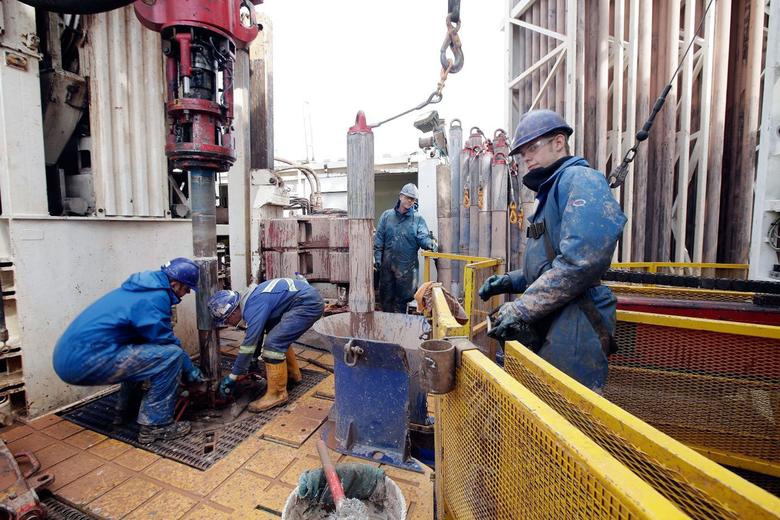
UK SHALE ATTACKED

Energy companies will be invited on Monday to bid for a new round of fracking licences covering more than half the country, but ministers insist that tougher planning rules will put national parks out of bounds unless "exceptional circumstances" prevail.
The opening of the first tender process in six years will open up swaths of the countryside to the controversial practice of shale gas extraction, from Scotland and the North East to parts of the south coast.
But in an effort to reassure environmental campaigners concerned about the contamination of water supplies, special protection will be given to national parks, areas of outstanding natural beauty and world heritage sites. Licence applications in these areas should be refused unless there are "exceptional" reasons why fracking should go ahead, or if it is deemed to be in the public interest, officials said.
Appeals by developers against local planning decisions will be overseen by Eric Pickles, the communities secretary, to ensure the guidance is being properly applied.
Matthew Hancock, business and energy minister, said that unlocking shale gas in Britain had the potential to provide "greater energy security, jobs and growth".
"Ultimately, done right, speeding up shale will mean more jobs and opportunities for people and help ensure long-term economic and energy security for our country", he said.
The Department for Energy and Climate Change also recognised that in areas of outstanding beauty, they would need to balance "environmental and heritage qualities" against the benefits of oil and gas from unconventional hydrocarbons.
Ed Davey, the Liberal Democrat energy secretary, secured the more rigorous planning regime after weeks of negotiation with the Treasury. His stance has created some tension with George Osborne's team at the Treasury; the chancellor is one of the leading advocates of a "shale revolution" to secure Britain's long-term energy needs.
The Campaign to Protect Rural England, welcomed the government's "change in rhetoric", saying that previous opposition had been stoked by the impression that ministers were committed to fracking "whatever the consequence and however sensitive the location".
"If fracking is to happen, we need to proceed with great caution and with the highest possible safeguards," said Shaun Spiers, the organisation's chief executive.
Greenpeace was more sceptical. Louise Hutchins, an energy campaigner with the group, said ministers had fired the starting gun on a "reckless race for shale" that could see fracking rigs spring up across the countryside. "Eric Pickles' supposed veto power over drilling in national parks will do nothing to quell the disquiet of fracking opponents across Britain," she warned.
"The only people who stand to benefit from shale drilling are the bosses of a few inexperienced energy companies, which have yet to prove they can operate safely, while local communities will bear the full brunt of the disruption and potential environmental damage," she added.
The oil and gas industry welcomed the move. Cuadrilla, the UK's most prominent fracking company, said it was "pleased" and that it would be "carefully assessing the exploration acreage included in the 14th round, whilst maintaining our immediate focus on securing planning consents for our proposed shale gas exploration sites in Lancashire."
UKOOG, the trade body for the onshore industry, said licences would help the country reduce its dependence on oil and gas imports and balance the decline of North Sea oil reserves.
"This new licencing round is all about focusing on the extraction of gas and oil at commercial rates," said Ken Cronin, the body's chief executive.
"The fact that the onshore oil and gas industry is one of the heaviest regulated industries in the UK and acts as an exemplar for the rest of Europe should be seen as a positive sign by all new investors," Mr Cronin added . . .
Fracking around the world
USA – US oil companies pioneered fracking and have begun in the past five years to extract vast oil and gas reserves. Since 2008 US crude oil production has risen 60 per cent and has counteracted big supply disruptions in other countries to keep the world oil price stable. But despite the fresh resources, producers have so far been unable to overturn an effective ban on exports of crude oil from the US that dates from the 1973 oil crisis.
GERMANY – Germany had an effective moratorium on fracking but earlier this month relaxed this to allow field trials.It was the subject of a fierce debate among the ruling coalition, with some keen to cut reliance on Russian imports and others fearful of the environmental impact on a densely populated country. The country has the strongest Green party in Europe, with a tenth of seats in parliament.
Opponents include brewers who fear the method, which involves water, sand and chemicals pumped underground at high pressure, could contaminate groundwater supplies that are used to make beer.
CHINA – Some estimates put China's shale reserves as the largest in the world, but a government mandate to develop the resources has failed to yield the large volumes and low costs of the privately developed industry in the US. The shale beds in China are harder to extract from, the pipeline infrastructure is less developed and state monopolies play a dominant role. Beijing wants to increase the use of shale gas as an alternative to coal as part of efforts to reduce severe air pollution.
ft.com





